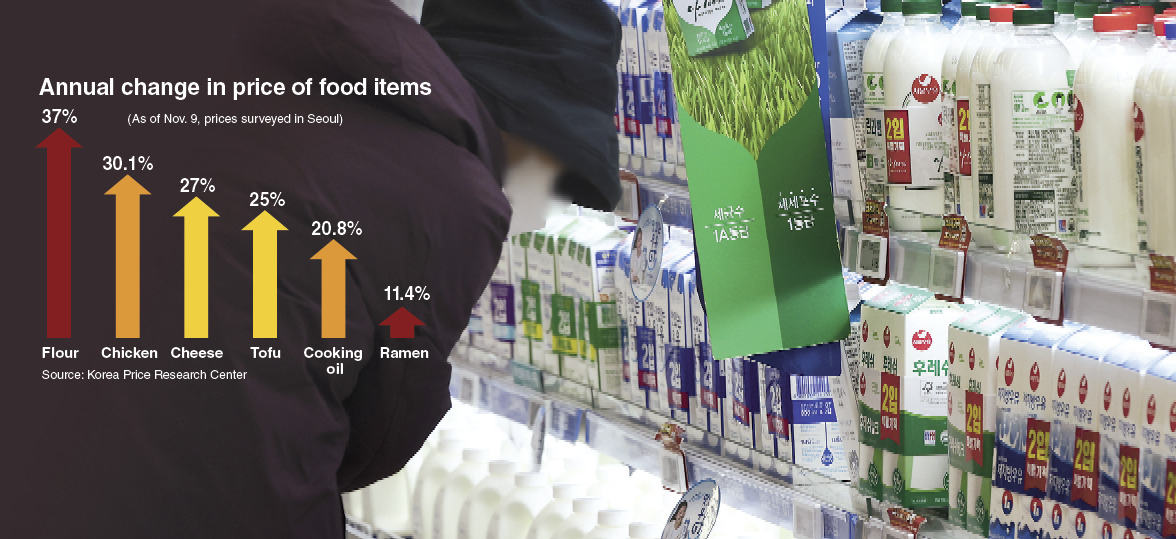Prices of food, daily necessities soar
‘Food prices likely to rise further until next year’
By Kim So-hyunPublished : Nov. 10, 2022 - 15:21

Prices of major food items such as flour, cheese, tofu and chicken have risen over 20 percent in the past year, while prices of daily necessities such as detergents and shampoo have also jumped.
Milk prices will surge again next week, which means the prices of bread, ice cream and coffee will also climb.
According to the Korea Price Research Center on Thursday, the price of a 1-kilogram pack of flour (CJ Beksul all purpose flour) surged 37.7 percent from a year ago to 1,900 won in the second week of this month (Nov. 9).
Prices of key processed foods such as mixed seasonings, cheese, tofu and cooking oil jumped 33.8 percent, 27.4 percent, 25 percent and 20.8 percent, respectively.
Prices also rose for salt (15.5 percent), powdered milk (14.2 percent), ham (12.5 percent), ramyeon (11.4 percent), sugar (11.2 percent), chili paste (9.7 percent), sesame oil (9.4 percent) and coffee (7.8%).
The price of beer (OB 500-milliliter) shot up 43.3 percent to 2,020 won, while soju (Hite Jinro Chamisul Fresh 350ml) became 7.8 percent more costly compared to the year prior.
Meat prices also rose significantly.
A 1kg fresh whole chicken is currently being sold at 9,520 won, up 30.1 percent from a year ago, while beef and pork prices also climbed 15.9 percent and 11.7 percent, respectively.
The most drastic price hikes are seen in the vegetable and seafood sections.
Prices jumped for 96.6 percent for radishes, 60.4 percent for carrots, 24.8 percent for onions and 13.1 percent for tomatoes, 110.6 percent for squid, 15.5 percent for seaweed and 12.8 percent for croakers.
Daily necessities also became more expensive with price increases of 55.3 percent for toilet paper (30 rolls of 30-meter Yuhan Kimberly Kleenex Deco Soft), 23.3 percent for laundry detergents, 20.2 percent for shampoo, 18.7 percent for kitchen detergents, 10.3 percent for toothpaste.
Fuel prices are not helping either.
Prices of lamp oil (kerosene), city gas and light oil (diesel) jumped 38.8 percent, 38.4 percent and 15.6 percent, respectively, while gasoline price fell 8.4 percent with fuel tax cuts.
Fruits like apples and pears have become less expensive compared to a year ago, while the price of rice has plunged 26.6 percent.
Milk prices are set to jump next week as the Korea Dairy Committee has announced it will raise the price of raw (unpasteurized) milk by 52 won per liter, marking its first price hike since August 2020.
Maeil Dairies and Seoul Milk said they will raise the prices of their 900-ml and 1-liter milk products by 9.6 percent to 2,860 won, and 6.6 percent to 2,890 won, respectively.
Namyang Dairy Products also said it will raise the price of its 900ml milk, but will keep it under 3,000 won.
Food prices soared around the world as the prolonged Russia-Ukraine war led to higher international grain prices, logistics and labor costs.
According to the UN Food and Agriculture Organization, the average global food price index for the 10 months to October stood at 145.8. The average FAO food price index for 2014-2016 is 100.
The average for 2015 through 2020 was under 100. It soared to 125.7 last year, and is continuing upward this year.
In Korea, as the domestic currency weakened drastically against the US dollar, imported items now cost more than before, leading to higher production costs.
Food prices are likely to climb further as international grain prices, which had been sliding since June, began to rise again recently with heightened tension in the Black Sea.
Should the avian influenza rage again in the winter, egg prices could soar.
Citing such reasons, food price watchers including Lee Eun-hee, a professor of consumer science at Inha University, and Lee Seung-seok, a researcher at the Korea Economic Research Institute (KERI), told Yonhap News that food prices will continue to rise at least until the first half of next year.
Lee at KERI said the overall inflation is likely to go on until the first half of 2023, and food price hikes will continue until the end of 2023.

















![[KH Explains] Hyundai's full hybrid edge to pay off amid slow transition to pure EVs](http://res.heraldm.com/phpwas/restmb_idxmake.php?idx=652&simg=/content/image/2024/04/18/20240418050645_0.jpg&u=20240419100350)

![[Today’s K-pop] Zico drops snippet of collaboration with Jennie](http://res.heraldm.com/phpwas/restmb_idxmake.php?idx=642&simg=/content/image/2024/04/18/20240418050702_0.jpg&u=)